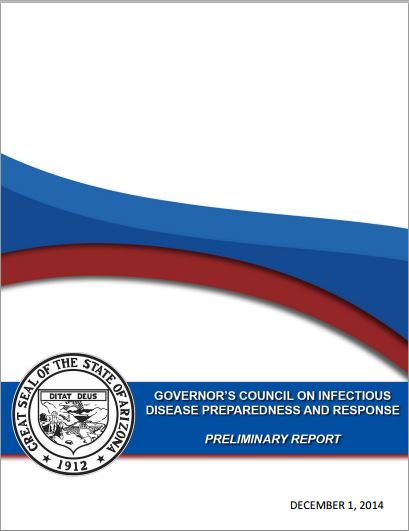 The Ebola virus, influenza, enterovirus, tuberculosis, and other emerging infectious diseases posed key public health challenges in Arizona during 2014, sparking important interventions. In October the Governor issued an Executive Order establishing the Council on Infectious Disease Preparedness and Response to develop and implement a coordinated plan to ensure Arizona’s public health infrastructure is prepared for the outbreak of diseases like the Ebola virus, influenza, enterovirus, tuberculosis.
The Ebola virus, influenza, enterovirus, tuberculosis, and other emerging infectious diseases posed key public health challenges in Arizona during 2014, sparking important interventions. In October the Governor issued an Executive Order establishing the Council on Infectious Disease Preparedness and Response to develop and implement a coordinated plan to ensure Arizona’s public health infrastructure is prepared for the outbreak of diseases like the Ebola virus, influenza, enterovirus, tuberculosis.
The Council examined existing preparedness plans and identified and filled key gaps in Arizona’s response plans and delivered a Report to the Governor that includes a series of new protocols and procedures that improve patient and community safety and strengthens Arizona’s public health and healthcare readiness to effectively deal with emerging infectious diseases.
There were 2 key pieces to improving our Ebola virus response readiness:
- Developing a protocol for monitoring travelers and clinicians that are returning to Arizona from the affected countries. A total of 41 persons have returned to Arizona from the affected countries since we began our active monitoring in October. Thirty-two of them have completed their 21-day monitoring period and 9 are still being monitored.
- Fleshing out the details of the emergency medical services and hospital response in case a returnee becomes ill. The University of Arizona Health Network joined the Maricopa Integrated Health System this year by committing to become an Infectious Disease Treatment Center of Excellence. As a result, Arizona is better able to develop a seamless infectious disease response plan as new infectious diseases emerge; ensure smooth patient transport; avoiding unnecessary healthcare worker and community exposures; and allow other hospitals to focus on screening and diagnosing patients.









